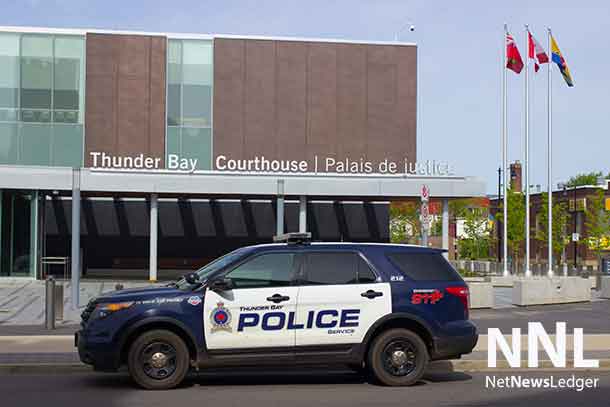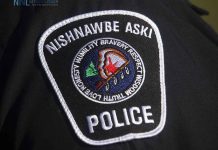THUNDER BAY – Since last November the Office of the Independent Police Review Directorate (OIPRD) has been examining the Thunder Bay Police Service. The Directorate is an arms length agency under the Ministry of the Attorney General of Ontario.
The OIPRD is engaged in this investigation following complaints raised by Indigenous leaders over the Thunder Bay Police Service’s handing of several cases involving Indigenous people in the city. The scope of the investigation has now been broadened.
The OIPRD are adding the two recent missing person’s cases involving Tammy Keeash and Josiah Begg as well as having reportedly added cases where the Thunder Bay Police Service has had other complaints raised against it.
The OIPRD will be meeting in the near future with Thunder Bay Police Service Chief JP Lesveque to set the process into action.
Nishnawbe-Aski Grand Chief Alvin Fiddler in a press conference at Dennis Franklin Cromarty High School on Wednesday said that their leadership does not have confidence in the Thunder Bay Police and their handling of cases involving missing Indigenous youth.
“All available resources should have been deployed on a 24/7 basis since the day Josiah disappeared and the city should be turned upside down until he is found. Police have done no better investigating Tammy’s death, accepting drowning as the cause but failing to determine how she ended up in the water,” said Grand Chief Alvin Fiddler. “Our communities do not have confidence in the police to conduct thorough investigations. Our leaders are now forced to pool their resources to coordinate their own searches and – potentially – fund their own private investigations. If the police won’t act, we will.”
The OIPRD Investigation will also looking at what complainants say is “systemic racism” by the Thunder Bay Police Service.
“These latest incidents are both tragic and extremely worrisome and have exacerbated the Indigenous communities’ crisis of faith in the Thunder Bay police,” according to Gerry McNeilly, the Independent Police Review Director for the OIPRD. “The police and the Indigenous community need to find ways to come together to work on strategies for communication and cooperation when indigenous youth go missing. The onus is on the police in this regard.”
There is a strong level of disconnect between many Indigenous people in Thunder Bay and the police service. Some of that disconnect has been reported by the CBC Fifth Estate, reports in Toronto media including the Globe and Mail and the Toronto Star.
These reports have in many cases taken the situation in Thunder Bay and taken the problems in the city to a national scale. Since the disappearance of Josiah Begg, and the discovery of the body of Tammy Keeash, many people are taking to social media under the hashtag #thisisthunderbay as well as posting experiences that they have had with police in some cases going back up to twenty years.
Following the deaths of seven students coming to Thunder Bay, the inquest looking into those deaths came up with a long list of recommendations that should be implemented.
Thunder Bay Police Service says they are working to implement the changes sought by the inquest.
In a statement issued by Thunder Bay Police following the NAN Press Conference, TBPS stated, “This is not the time for pointing fingers. It is the time to join hands and work towards our common goals of finding answers. Together, we can make that happen”.
Joint Inquest (Deaths of 7 First Nation Youths) Recommendations
Thunder Bay Police Service Efforts as of May 2017:
Recommendation 91 includes NAN, City of Thunder Bay, TBPS, NAPS, NNEC, KO, DFC and MLC as being responsible for the formation of a working group to discuss best practices applicable to their respective roles pertaining to students from remote First Nations communities attending secondary school in Thunder Bay.
Chief Levesque was the first leader to initiate contact with all involved parties in September 2016 to ensure that the inquest recommendations would be addressed. Since that time, the TBPS has met separately with the named parties to discuss the 13 subsections of recommendation 91. We have moved forward on a number of initiatives to address these recommendations which are in place today.
There are 8 named parties for this working group which includes a number of educational organizations. The key to being able to effectively address recommendation 91 is to have all parties involved in a coordinated effort. As of Friday May 5, 2017, an inquest coordinator from NAN was designated to bring all of the named parties together to address all of the subsections of inquest recommendation 91.
The Thunder Bay Police Service efforts to date include:
- Public awareness of Missing Person report procedures are available on the TBPS website http://www.thunderbaypolice.ca/missing-persons
- Changes were made to our missing person policy prior to the inquest. Since this is an operational policy, we continue to review and revise as appropriate. Officers have been provided up to date training on these procedures.
- The TBPS is working with Matawa, DFC, KO, and NNEC on missing persons’ protocols and contact information for their on-call workers. The Police Service has requested a set list of descriptors and identifiers for all students attending Thunder Bay from Northern First Nations Communities.
- The TBPS utilizes social media as one of the many tools used in missing person investigations.
- Press releases are created by the TBPS in consideration of the specific circumstances of each individual investigation. The working group still needs to consider best practices for media releases.
- NAN Legal Services has been utilized as a liaison to assist persons who have challenges or fears in their dealings with police.
- Walk a Mile training continues for members of the TBPS. Over 80% of our members have received this training.
- The TBPS Training Unit provides the Police Services Board with an annual report summarizing training undertaken by our members.
- The TBPS provided personal safety training to members of the Bear Clan Patrol (a NAN initiative) which is a citizen’s group that conducts foot patrols to promote safety within the Indigenous community.
- Since the fall of 2016, the TBPS conducts focused daily foot patrols along city waterways and recreational trails which have been previously identified as high risk areas.
- The TBPS has collaborated with the City of Thunder Bay’s Safety Audit Committee. Three safety audits have commenced this week (May 15, 2017). These will look at 3 high risk areas near city waterways and provide recommendations for improvements to public safety.
- The TBPS and the LCBO have formed a working task force to look at the issue of “runners” who are second party purchasers and are providing alcohol to minors.
- The TBPS has partnered with NAPS, Matawa, DFC and NNEC to fly officers to northern First Nation communities to provide insights to students as they make the transition to an urban community.
- The TBPS is providing advice and guidance to the 211 call reporting group. This initiative will assist members of the public to report incidents of racism in Thunder Bay.”
OIPRD Scope of Expanded Investigation:
The systemic review will examine the following:
- Existing policies, practices and attitudes of the Thunder Bay Police Service as they relate specifically to Indigenous missing persons and death investigations, and more generally, to issues around racism-free policing, such as “over-policing” and “under-policing”
- Whether missing persons and death investigations involving Indigenous Peoples are conducted in discriminatory ways
- The adequacy and effectiveness of existing policies and identified best practices relating to the above issues
- The adequacy of training and education provided to supervisors and front-line officers relating to the above issues
- The extent to which compliance with existing policies or identified best practices is monitored and supported
- The extent to which officers are held accountable for non-compliance
- The extent to which the service communicates with Indigenous family members,communities and their leaders, engages in community outreach or has specialized liaison
units
- The extent to which complaints about the service’s interactions with Indigenous Peoples are
inhibited by reprisals or fear of reprisals
• Whether policies, practices, training, education, oversight and accountability mechanisms, and community outreach should be created, modified or enhanced to prevent discriminatory and ineffective policing, particularly in the context of investigations into the disappearances and deaths of Indigenous Peoples








